 Eastern Mojave Vegetation
Eastern Mojave Vegetation
Tom Schweich
 Eastern Mojave Vegetation
Eastern Mojave Vegetation
| Field Notes (Continued) |
|
Tom Schweich |

Topics in this Article: 1800s 1900s 1910s 1920s 1930s 1940s 1950s 1960s 1970s 1980s 1990 1991 1992 1993 1995 1996 1997 1998 1999 2000 2001 2002 2003 2004 2005 2006 2007 2008 2008 Tour de Swertia albomarginata Mono Lake, August 2008 2009 2010 2011 2012 2013 2014 2015 2016 2017 2018 2019 2020 2021 2022 2023 2024 2025 Contents Literature Cited |
When I first read the field notes of Annie Alexander and Louise Kellogg, I was fascinated by the descriptions they wrote about the places they went and the plants and animals they found there. By publishing my field notes on the Internet I hope to follow a little bit in their tradition. | ||||||
|
|
1999 | ||||||
My 1999 Trip to Spain | |||||||
|
|
Sunday, February 7th | ||||||
| My plane took off about on time, 755 AM, from San Francisco. We took off and immediately were above the clouds, and didn’t see the ground again until we landed in New York. After a two hour stop, I got back onto the same plane, in the same seat and left for Madrid | |||||||
|
|
Lunes, 8 de Febrero | ||||||
| Arrived Madrid about 7:00 AM, 30 minutes ahead of schedule. I was sleepier from San Francisco to New York than I was from New York to Madrid. Had some trouble getting the telephones to work. Finally I bought a 1000 pts phone card that I used to gain access to AT&T. | |||||||
| The temperature was 37°F at the airport, which felt crisp and cool. The bus came in a few minutes and cost 385 pts. each. The driver could make change. I took the bus to Madrid where it stopped under the Plaza de Colon. There was a taxi stand with taxis waiting at the bus stop below Plaza de Colon. I took a taxi to Estacion Atocha. Bought tickets for Toledo and were sipping good orange juice, eating a croissant and café con leche by 9:30 AM. Estacion Atocha has a tropical garden with a small cafeteria. | |||||||
| I tried the ATM, just to make sure it worked. Had a small problem over commas vs. decimal points, but eventually figured out how to liberate 20,000 pts from the ATM from my checking account in the US. | |||||||
| The train from Madrid to Toledo is the Cerancias, a kind of regional train, which is electrified and runs on regular track. The last half of the distance to Toledo it operates over single track, with automatic block signals. | |||||||
|
Locations: Toledo. |
The hotel is the Hostal del Cardenal. I arrived in Toledo about 1145. Shared a cab ride with a German couple. The parador asked for my passport, which I gave to them. This was one thing I was unprepared for. Every hotel asked for my passports. Most of them used the passport to fill out a form, and returned it immediately. Only the parador in Toledo kept my passport overnight. | ||||||
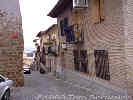 Narrow street on the southwest side. Narrow street on the southwest side.
|
After a shower, had lunch: roast chicken, French fries and a green salad. Then I walked around the city for a couple of hours. Lots of narrow streets. I often had to step into a doorway to let cars pass. I walked through the cathedral which did not appear to be large in the exterior but was quite large on the inside. Built 13th – 15th century, I saw 3 pipe organs. The cathedral was really dark inside, and quite dusty. Toledo is built on a hill which is surrounded on three sides by the Rio Tajo. I tried to get a good view of the river but failed. Never did find a good spot to see the river from above. On the way back to the hotel, I bought some honey-roast peanuts in case I got hungry later. | ||||||
|
|
Martes, 9 de Febrero | ||||||
| After 14 hours of sleep, I had breakfast, then headed out about 1000 AM. Slept all night but sounds carried in the hostal, and we heard television and much flushing. It was quiet after 1:00 AM and people started to stir again about 6:30 AM. | |||||||
|
Locations: Toledo. |
This day I walked around the northeast side of Toledo, until I came to the synagogue. Visited that, it has an overlay of Christianity. Saw some CDs of sephardic music but did not buy, then headed for the Casa y Museo de El Greco. On the way I saw the street San Juan de Dios has lots of shops that I walked around. | ||||||
| At the Iglesia de Santa Tome I saw the famous El Greco of somebody’s interment. It was a cool painting with lots of interesting lights. After that, I found our way to Museo-Casa El Greco, where we saw the “Plano de Toledo” and lots of his other paintings. His paintings of the apostles all look alike. They all have narrow faces and crook noses. | |||||||
| Visited Museo Sefardi, which was right near the El Greco museum. Here I found the all-important Aseos (bathrooms). The primary part of the interior of the museum is a former synagogue. From there I walked up the hill past the Cathedral to El Alcazar. In the Alcazar, I saw much evidence of man’s inhumanity to man, including the dungeon where the king kept his queen. It was starting to rain lightly. | |||||||
|
Other articles:
|
Lunch at the Restaurante Maravilla, nice, friendly, good food and very close to Plaza Zocodover. After lunch I did the Museo de Santa Cruz. Saw another El Greco, the light in this painting was obvious from a long way away. Saw a bust of Christ and Virgin Mary from the 17th century that was very impressive. The eyes seemed to glisten, and the teeth and tongue were very lifelike. Talked to the docent at Museo Santa Crus. The docent told me that these particular pieces were from the 17th century and quite unique in their lifelike-ness. He wanted to know if I had gone to the Prado and El Escorial. When I left the Museo Santa Cruz, it was raining harder now, as I wandered through the streets, trying to find a shorter way back to the hostel. | ||||||
| At the hotel, they gave me back my passport, don’t know how they decide when to keep and when to return a passport. | |||||||
| I noticed the electrical wires in bundles on the sides of buildings. Also noticed that the downspouts come down the buildings and then are inset into the wall until ground level. This is to avoid damage from cars. | |||||||
|
|
Miercoles, 10 de Febrero 1999 | ||||||
| South of Madrid the soil is red. The hills have the look of Juniper woodland, but the trees appear to be pines. Limestone hills have oaks. | |||||||
| After breakfast I walked again up to Plaza de Zocodover. I bought marzipan and we bought stamps. Ten stamps for 1150 pts. At the hotel, they called a hotel in Cordoba and make reservations for me. Then I checked out and took a taxi to the Toledo train station. | |||||||
| Took the 12:30 Cercanias to Madrid. The Cercanias is really not designed for people with a lot of luggage, like us. The overhead bins will hold your backpack, but we had to take an extra seat for out suitcases. | |||||||
| In Madrid I bought AVE tickets for Madrid to Cordoba, and then Cordoba to Sevilla. It looks like I bought round trip tickets for 7100 pts, about $50, round trip. | |||||||
|
Locations:
Cordoba.
|
The AVE took 1:40 hr. For most of the trip the train crosses a plain and ascended very gently through rolling hills. Slowed down briefly at Puertollano, which appears to have a power plant at a coal deposit. From a pass near there the AVE descends the mountains into Cordoba. Almost as soon as the valley floor is reached, the train pulls into Cordoba. The countryside is rural and agricultural. Lower forested slopes reminded me of the oak woodlands just east of Red Bluff. A little higher (or steeper) reminded me more of the chaparral between Jamestown and Georgetown, e.g., Priest Grade. | ||||||
| Took a taxi from the station to the hotel; think the driver took us for a bit of a ride, through the narrow streets, got lost on my first walk; went the wrong way but figured it out eventually. The streets are very narrow here in the former Jewish ghetto. | |||||||
|
Locations:
Cordoba.
|
| ||||||
|
Locations:
Cordoba.
|
At restaurante Tio Pepe, I had a very nice shrimp, garlic and lettuce salad. The roast suckling pig almost made me barf at first, because it wasn’t very tasty and was a bit chewy. During the dinner the waiter asked where I was from. Then when he brought our dessert the dessert chef had written “San Francisco” in the sauce. In our room were all tourists. Each of us got something cute like that with our desert. I guess it was a sort of “tourist trap” thing. But it wasn’t overdone, and the food at the restaurant was pretty good. | ||||||
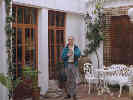 Hotel Albucasis Hotel Albucasis
|
I thought I are the only person in the Hotel Albucasis that night. But in the morning it turned out that there was one other couple in the hotel. | ||||||
|
|
Jueves, 11 de Febrero | ||||||
| This morning I got up and had a light breakfast, then walked around the juderia de Cordoba. Need to learn dejar, to leave, as in “queremos a dejar las maletas,” “desalojar” which must mean something line to check out. and abonar to leave or give up. It’s not abandon since the Spanish verb for that is abandonar. I got these words from reading the check-in receipt we got at the Hostal del Cardenal in Toledo. | |||||||
| I also need a lens cap for camera, so I need to ask, “Estoy buscando para una tapa para la lente de la camera.” And perhaps, “Hay una tienda fotografia cercano de aqui?” | |||||||
| I left my suitcase at the hotel in Cordoba, so we need to learn to ask, “Nos gustamos a desalojar y dejarse los maletas aqui mientras andamos alreddedor la vicinidad.” | |||||||
| In Cordoba, I found several shopping areas. Bought some washcloths because, so far, the hotels don’t seem to have them. There were many more stores in Cordoba than we saw in Toledo. Asked in a store for a lens cap, but they didn’t have one. By the time I left Cordoba, I felt I had seen it well. | |||||||
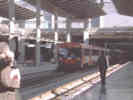 The Andalucia Express at Cordoba. The Andalucia Express at Cordoba.
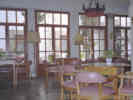 Inside Hotel Albucasis. Inside Hotel Albucasis.
|
I went back to Hotel Albucasis and got my luggage and asked them to call a taxi. There was a workman in the lobby digging up tiles for some reason. He had an electric hammer and was putting the broken tiles into plastic shopping bags. Took the taxi to the train where I waited for about 1½ hours. Had some small mix-up about the seats as there was another person who had the same seat assignment as I did. No one checked our tickets except on the platform at Cordoba. | ||||||
|
Locations:
Sevilla.
|
In Sevilla took a taxi to our hotel, the Hotel Simon. Downstairs there is a sitting room and a restaurant. It is only used for breakfast. Upstairs there must be 10-15 rooms. | ||||||
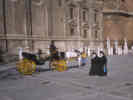 Nuns and a horse carriage behind the Cathedral Nuns and a horse carriage behind the Cathedral
|
Rachel came from school almost as soon as I checked in. I chatted with her for a while and then went to dinner at Restaurante San Martin. I had spaghetti in meat sauce. | ||||||
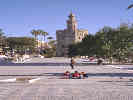 Children paying with a Fisher-Price barn and farm animals near the Torre de Oro. Children paying with a Fisher-Price barn and farm animals near the Torre de Oro.
|
Rachel went to dance class and then came back to the hotel. She demonstrated the Sevillana, which she is learning. After talking some more, we made phone calls and then went to dinner. Rachel had paella. I had a “salad” of shrimp, avocado, pineapple and walnut with some sort of mustard(?) dressing. Kind of a strange mixture, but it was really very good. | ||||||
|
|
Viernes, 12 de Febrero | ||||||
|
Locations:
Sevilla.
|
| ||||||
| Rachel was pretty tired as she was recovering from a virus, so we got coffee, tea and bollas. Then we walked the Sierpes, one of several narrow streets in the shopping area. | |||||||
| Had a fine lunch at Casa Robles. The house salad was endive, escarole, shrimp, salmon and a little caviar with a 1000 Island dressing. I think this was probably the only salad lettuce salad for which there was a dressing other than vinegar and oil. Then I had grilled lamb chops, small but very tasty. | |||||||
|
Locations:
Rio Guadalquivir.
|
Went back to the hotel and rested, then went to meet Rachel's Señora. Had coffee and cookies and Rachel translated until her voice gave out. Then dropped off Rachel’s present at our hotel and walked the Sierpes again, ending up at El Corte Ingles, a large department store chain in Spain. They had a bit of Marklin track but no trains. They didn’t seem to manage their stock very agressively. | ||||||
| Had dinner at Restaurant Las Escobas. It was right next to Casa Robles, on a corner near the Cathedral and right at the edge of Barrio de Santa Cruz. The Gazpacho was pureed and very good. I think this is the place that I had the really good gazpacho. The rest of the “Home Cooking” meal was 3 chicken drumsticks, french fries, and a little lettuce salad, and that’s pretty much it. | |||||||
|
|
Sabado, 13 de Febrero | ||||||
| Rachel came over and we took a taxi to the Hertz place. We got a diesel Seat Cordoba. Since our hotel had no parking, we drove to a parking place and Rachel went back to her apartment to rest a bit. Then I practiced driving a bit. Made a loop through Calle Zaragoza, through the Plaza Nueva, right on Calle Garcia de Venusia, past the hotel and then back to our parking place. Calle Zaragoza is one of those very narrow streets with little or no sidewalks. Walked to the hotel, exchanged stuff, and then walked to the Cathedral. | |||||||
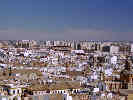 View to the north from the Cathedral tower. View to the north from the Cathedral tower.
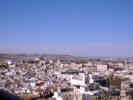 View to the south. View to the south.
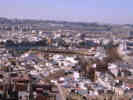 View to the south. View to the south.
|
| ||||||
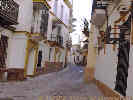 Narrow street in Barrio de Santa Maria. Narrow street in Barrio de Santa Maria.
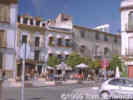 Restaurants on the edge of the Ghetto de Santa Maria. Restaurants on the edge of the Ghetto de Santa Maria.
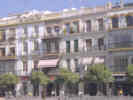 Row apartments along a street. Row apartments along a street.
|
| ||||||
|
Other articles:
|
| ||||||
|
|
Domingo, 14 de Febrero | ||||||
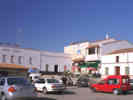 Where we ate lunch in Monesterio. Where we ate lunch in Monesterio.
|
On Sunday, I drove to Italica, and then to Monasterio, but I didn’t do the monastery. | ||||||
| Met Rachel in the morning. She really didn’t feel well and needed to rest for the day, so she went back to her apartment while I tried to see something that day. I set out for Italica, a Roman ruins just north of Sevilla. Somehow I was headed south on the freeway when I should have been going north. It took a while to get this straightened out. Meanwhile, at 100 km/h on the freeway I were now headed east around the south side of Seville. Since this was working, I decided to continue on the freeway loop around Seville. Not more than 20 minutes later I was headed north from Seville to Italica. | |||||||
|
Locations:
Italica.
|
| ||||||
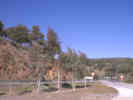 Along Highway N630 north of Sevilla Along Highway N630 north of Sevilla
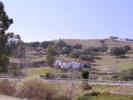 Farm along highway north of Sevilla Farm along highway north of Sevilla
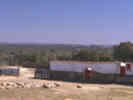 Sheep in corral, north of Sevilla. Sheep in corral, north of Sevilla.
|
| ||||||
| Tonight we went to see “You’ve Got Mail.” This was in English with Spanish subtitles. After the movie we had Mexican food. I got a flauta, which was a corn tortilla wrapped around chicken and lettuce, drizzled with cheese and broiled. | |||||||
|
|
Martes, 16 de Febrero | ||||||
| Yesterday was the day I got sick. After breakfast I went to the Sevilla train station (Estacion Santa Justa) to buy tickets to Madrid and Santiago de Compostela. I confused the lady by nodding when she said “caja” rather than “credito.” It cost us 9000 pts “caja” for our Sevilla-Madrid tickets. Then I bought the Madrid-Santiago tickets, and managed to answer the “caja o credito” question correctly this time. Then when I asked for the Santiago-Madrid tickets she got all upset because we had just bought those tickets for the 22nd and why did I now want to buy them for the 24th. Finally she understood that these were the return ticket and we got it all straightened out. After the ticket-buying episode, I had to sit on the bench and rest for a few minutes. Although perhaps I was already beginning to feel sick from the food. I also found a Hertz station at the Estacion Santa Justa. This will be much more convenient for me when I return the car. | |||||||
| On the road, about an hour out of Seville, I began to feel very nauseated. Finally stopped, got fuel and a Diet Coke, but continued to be quite nauseated. Otherwise I don’t remember much about this day. There was one highway grade I could see in the distance. The north side of the grade on the highway between Antequera and Malaga was very short and steep, and it was quite a long run down the canyons to Malaga. I found the botanical garden, there was a sign on the highway. Unfortunately, this was a Monday and the garden was closed. | |||||||
| I pressed on, thinking I might stop in Malaga, or someplace close. Driving down little streets as I worked my way through Malaga. It’s a big city and very resort-y, but otherwise not too attractive to me. | |||||||
|
Locations: Nerja. |
Went on to Nerja. Thought I would go to the tourist office, get a list of hotels and find one. Made the city loop twice, saw a sign pointing to the Tourist Office, but never saw the office itself, gave up and headed out of town. Up at the highway, I spotted a hotel. It was an ugly tourist affair, but we needed to stop. The “H” sign for Hotel had four stars so I stayed there. I had 2 bites of a mocha bar for combined lunch and dinner. Mostly I wanted to sleep. | ||||||
|
Locations:
Tabernas.
|
In the morning I had a light breakfast and headed east towards Almeria. When I got there, I didn’t feel like stopping so I headed north to Tabernes, the desert of Spain. I found the tower that had the “Hollywood” sign, but the sign itself is gone. There were a couple of movie sets that could be visited, where the “spaghetti westerns” are filmed. | ||||||
|
Locations: Tabernas. |
I drove into Tabernas, where I bought some lunch supplies, yoghurt and some crackers, then set off on the highway for Granada. | ||||||
|
Other articles:
Locations:
Tabernas.
|
| ||||||
| Drove straight to Granada, then around and around. Tried to follow the signs to the tourist office, but couldn’t find it in the little streets of downtown Granada. Headed toward the Alhambra. I abandoned my car in a parking lot below the Alhambra and walked up the hill to find a hotel. | |||||||
|
|
Miercoles, 17 de Febrero | ||||||
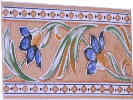 Tile that we especially liked. Tile that we especially liked.
|
The Hotel Guadalupe was a lucky find. After I checked in, I rested and got dinner. The dining room doesn’t open until 8, so we went up the hill to the next hotel, the Hotel Alixandes. Their dining room opened at 7:30 PM. It was a buffet with some sort of food that approximated everyone’s tastes. | ||||||
| At the Hotel Alixandes, the tourists were Asian, Japanese I expect. I keep expecting the Asian people to speak English, probably because I work and play volleyball with a lot of Asian people, so it was quite a shock to learn that there are Asian people – from Asia! – who don’t speak a lot of English. On the other hand, this afternoon there were two young Asian men for whom I waited while they took their pictures. Then they said “Thank you” without a discernable accent so I suspect that were Asian-American or had spent quite a bit of time in an English-speaking country. | |||||||
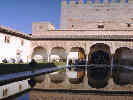 Courtyard. Courtyard.
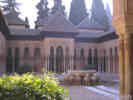 Court of the Lyons. Court of the Lyons.
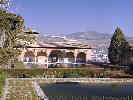 Courtyard. Courtyard.
|
In the Alhambra, the Gardens of the Nazarid Kings are the best part. Your visit is timed. Our entrance time was from 10:00 – 10:30. You can stay as long as you like but you must enter between these times. The fountains and plaster decorations were very beautiful. | ||||||
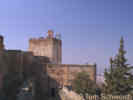 The Alcazar (fort) at the Alhambra. The Alcazar (fort) at the Alhambra.
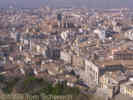 View of Granada from El Alhambra. View of Granada from El Alhambra.
|
Touring the gardens leaves you back at the main gate, and you have to walk back down to the Alcazaba, which is the military fort section of the Alhambra. I think it is a plot to rush you through the Alcazaba, force you through the Gardens and then on to the Generalife. Anyway, I did the gardens, then the Alcazaba, then the Renaissance Palace of Carlos V. | ||||||
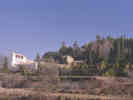 The Generalife from below. The Generalife from below.
|
The Palace had columns of conglomerate. Most of them were in good shape but a few had been repaired. The balcony rails were also conglomerate and had decomposed in several places. You could also see where the marble steps had been repaired by dove-tailing in a small piece or marble. I had a buffet lunch at the only place to eat inside the Alhambra. It was passable, and I didn’t get sick. Then I walked up to the Generalife. | ||||||
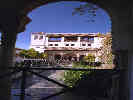 Patio de la Acequia Patio de la Acequia
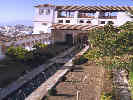 Patio de la Acequia Patio de la Acequia
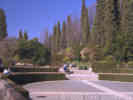 Gardens at the Generalife. Gardens at the Generalife.
|
| ||||||
| The Escalada de Agua was a nice touch, but a little more creativity could have done more with the water. Such as directing the water slightly to one side so as to make a swirl or varying the angle of descent to invoke a “hydraulic jump” then a fall. Although perhaps this may be hard to do on a small scale. | |||||||
| Here the gardens were also very attractive. There was a stage and theater backed by the gardens. The gardens had lush cypress hedges that were trimmed like castle walls. The cypress hedges dampened much of the noise and could give a quiet but airy shade in the summer. | |||||||
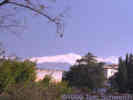 Sierra Nevada from Granada. Sierra Nevada from Granada.
|
On the way out of the Alhambra, I came upon an ambulance crew working on a man who died. He was laying on the dirt with a Cruz Rojo crew around him, and the Assistencia Urgencias who came later. Things weren’t going well. He wasn’t getting aerated because his chest wasn’t rising, and the crew wasn’t very intense about doing compressions. Even their endotracheal tube wasn’t set up properly for insertion. Not like the “Emergency 911” we used to watch and try to emulate in our emergency services at home. | ||||||
|
|
Jueves, 18 de Febrero | ||||||
| My hotel was pretty much empty when I went to bed, but I soon found out why. The young tour group showed up about midnight last night, and proceeded to keep us awake for about an hour and a half. At one point, they rattled the door handle to our room. After the 3rd time I shouted, “Hey! Knock it off!,” which merely set off more giggling in the hallway. In the end I called the hotel desk and said, “Favor de llamar a la direction del grupo y preguntar para silencio.” The night desk said, “Recuerde,” but that had little effect either. They finally settled down and we got to sleep around 200 AM. | |||||||
| Got up and had breakfast. They are re-doing the dining room at the Hotel Guadalupe so the smell of paint was quite strong. There was another American family in the dining room and they, or rather the mother, was having such a hard time. They didn’t want to sit at the assigned table, and it took a long time for them to understand that the other tables were set up for “el grupo.” Then she didn’t like the looks of the food, and then something else. She was having a really hard time. I hope their day got better. | |||||||
| Anyway I checked out and loaded the luggage into the car. The automatic cash machine wanted 3600 pts. It took a 2000 pts bill and then refused to take any more bills. Perhaps its capacity is one bill and any number of coins. Fortunately, we had 3 500 pts coins. Those and a 100 pts coin made the 3600 pts I needed to get my car out of hock. | |||||||
| As I drove down the hill from the Alhambra, I noticed the Autovia that leads across the south side of Granada. This would have been the best way to approach the Alhambra, rather than through the center of town. On the Autovia (freeway), I went north for a while, and finally west on A-92, the Sevilla – Almeria, por Granada highway. | |||||||
| The drive to Sevilla was uneventful. The sky was quite hazy. Stopped for a few pictures at Loja. On the outskirts of Sevilla I selected the wrong lane and ended up reversing our direction. Fortunately I immediately came upon a matching structure at which I reversed my direction again. The next time I was smarter about which lane to select. | |||||||
| Left Granada at 10:15 AM and pulled into the parking lot at 13:25, 3 hours, 10 minutes from Granada to Sevilla. | |||||||
| Met Senora and Antonio and Juan-Carlos, Lauren and Rachel for tapas. I had Pollo Frito, Patata Ali-Oli, and Tortilla Española. The Patata Ali-Oli was basically potato salad, but spiced with lots of garlic, very good. | |||||||
| By this time I was getting nervous about getting hotels in Santiago and Madrid. We went to a travel agent with a strange system of vouchers and tickets. Got my reservations in Santiago, but not for Madrid. The guy tried to tell us all the hotels were full in Madrid. I found that hard to believe. So I only got reservations in Santiago. | |||||||
| Bought a few trinkets at Los Sierpes and dinner at Casa Robles again. Still very good. Just a little expensive. In a newsstand, Found 2 journals of Spanish ecology, one called “Quercus” and the other called “Biologico.” | |||||||
|
|
Viernes, 19 de Febrero | ||||||
| Today, I traveled from Sevilla to Ronda. I did this by way of Jerez, Arcos, Ubrique, and Grazelema. | |||||||
|
Locations:
Grazalema.
|
| ||||||
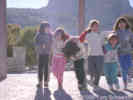 Six little girls entertain us in Grazalema. Six little girls entertain us in Grazalema.
|
In a play area near a school, six little girls were climbing over the rocks. They came and played in a pavilion on a point of rocks. The little girls – and some of the older boys – all said “Good Morning” and “Hello.” | ||||||
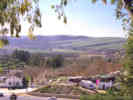 View of countryside west of Arcos. View of countryside west of Arcos.
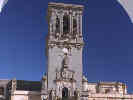 Church of Santa Maria de la Asuncion Church of Santa Maria de la Asuncion
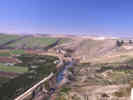 View west from the high point in town. View west from the high point in town.
|
Arcos was OK – but the castle was not open for visits. I think at this point I wasn't sure what to look for, or what to expect. | ||||||
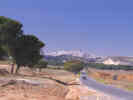 Looking west at Arcos de las Frontera Looking west at Arcos de las Frontera
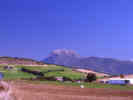 Looking east at the Sierra Margarita Looking east at the Sierra Margarita
|
From Arcos towards El Bosque, we drove along A372. Here I got my first view of the Sierra Margarita. At El Bosque I turned south to Ubrique. | ||||||
|
Locations:
Ubrique.
|
Ubrique was kind of a bust – seemed like an industrial city, with not much retail. It seemed like some of the manufacturer’s shops might have been open, but we really couldn’t tell. I had lunch in Ubrique, a bocadilla de jamon serrano. This is the preserved ham that every restaurant has hanging around. It seems mostly like the ham-equivalent of chipped beef. Above Ubrique I stopped and took a picture of a lily beside the road. | ||||||
|
Locations:
Benaocaz.
|
Between Ubrique and Grazelema there was one little town – started with a B – that faced into the sun. Later, looking at the Michelin map, this town turned out to be Benoacaz. When I stoped to take the photograph of Benoacaz, I noticed the Asphodelus in the field next to the highway. | ||||||
|
Literature Cited:
|
In route from Benoacaz to Grazelema we climbed toward a pass. Stopping just below the pass, I found and took pictures of a low-growing iris. From the photographs in Polunin and Huxley, I tentatively determined this to be Iris xiphium. Some time later, François M wrote to say that this is I. planifolia. | ||||||
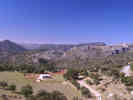 Between Benaocaz and Grazalema. Between Benaocaz and Grazalema.
|
One thing I noticed were little islands of vegetation in the plowed fields. Rather than plow through the difficult spots, the farmers would plow around them. Although I suspect that the total amount of land set aside by this method is actually quite small. | ||||||
|
Locations:
Ronda.
|
I pulled into Ronda and abandoned my car in the parking lot under the town square. By this time I had learned: don’t drive your car around the little streets looking for a hotel. I walked a block from there to the tourist office. From their list of hotels, I selected a three-star hotel, which was just around the corner. They had a room for two nights, which I took. Then I walked over to the car parked under the town square and got my stuff. I think this is the way to do it, abandon your car and set off on foot to find a hotel, rather than to try to find a hotel while driving. | ||||||
|
|
Sabado, 20 de Febrero | ||||||
|
Locations:
Cueva de la Pileta.
|
| ||||||
| Our tour group comprised 16-17 persons. We used 3 gas lanterns; one for the guide and one each for two volunteers. These gas lanterns had no glass bowls. I volunteered to carry a lantern. It put out a lot of heat, and I burned my hand a couple of times. The whole affair probably wouldn’t pass US safety regulations. The cave and the paintings inside were very interesting. | |||||||
|
Locations:
Ronda.
|
When I examined the rock that forms the cliffs of Ronda, it appeared to be a conglomerate, with sub-rounded to rounded particles up to cobble size. | ||||||
|
Locations:
Ronda.
|
| ||||||
|
|
Lunes, 22 de Febrero | ||||||
| Today I am on the train to Madrid. The train is full, at least in tourist class. | |||||||
| Yesterday (Sunday) I started in Ronda. After breakfast I discovered the parking bill on my hotel bill. This solved a small mystery, because the parking attendant waved us out of the garage on Saturday morning, when I was expecting to pay. | |||||||
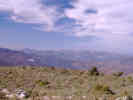 Countryside south of Ronda. Countryside south of Ronda.
|
Sunday morning I drove south on the highway to a pass. On the way I only got a glimpse of the Mediterranean Sea. I stopped at some monument. There were goats grazing here. In the distance I could see 4 or 5 white towns. | ||||||
|
Locations:
Zahara de la Sierra.
|
Then I went to Zahara – this was back on the highway between Arcos and Ronda. I had to go past a reservoir and then turn back, then cross the dam before we got to Zahara. I parked in a likely looking spot and then walked up, up and up into the town. In the town square was a very pretty little church that was open. I had a Coke at the bar, in part so I could use their restroom, and then walked a little further up the hill. | ||||||
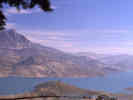 Embalse de Zahara, a reservoir near the town of Zahara. Embalse de Zahara, a reservoir near the town of Zahara.
|
The cemetery was on the side of the hill with niches above ground. This was as far as I went, as by this time, no one wanted to climb up to the castle. | ||||||
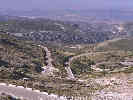 The road to Puerto de las Palomas from Zahara The road to Puerto de las Palomas from Zahara
|
I walked back to the car and started up the road to Puerto de las Palomas, a pass between Zahara and Grazalema. This road was steep, winding, and fairly narrow. | ||||||
|
Locations:
Puerto de las Palomas.
|
At Puerto de las Palomas, I was inside Parque Natural de la Sierra de Grazelema. This pass affords a very nice view. There are several opportunities to hike from here using several trailheads. | ||||||
| The Junta de Andalucia maintains a web site about Parque Natural Sierra de Grazalema with maps and plant lists. | |||||||
|
Locations:
Puerto de las Palomas.
|
From there to the next pass, Puerto del Boyar, was some of the prettiest country side we have seen. I came within several kilometers of Grazalema on this road, before turning west towards El Bosque. | ||||||
|
Locations:
Puerto del Boyar.
|
On our way west I passed through Puerto del Boyar. This was a place to have a picnic with this parking area, a monument, some picnic tables, and a trailhead. Between Puerto del Boyar and El Bosque, there were some additional nice places to stop and have a picnic. This being Sunday afternoon, many Spanish families were doing just that. | ||||||
|
Locations: El Bosque. |
I stopped in El Bosque to eat. I had a plate of pot roast, two consume con yema, and two Tortilla Española (Potato, egg, and maybe a bit of cheese.) | ||||||
| By this time I was quite certain that the gas gauge of the car was stuck on full. So I filled the car again in Arcos. | |||||||
| The car rook 12 liters for Arcos, Ubrique, Grazalema, Cuevas de Pileta, Ronda, Zahara, EL Bosque and back to Arcos, with quite a bit of mountain driving. I knew the gas gauge was on full a lot --- the Spanish gas stations tend to fill until the fuel pipe overflows. But several times earlier in the week, the gauge got down to ½ full. So it must have broken at some time during the trip. | |||||||
| Got back to Seville about 6:30 PM. Went by Señora’s to say goodbye, but she and her brothers had gone to see a sick uncle. At the hotel we chatted, then went to dinner at the Italian place. | |||||||
| This morning I got up at 7:00 AM following a restless night. I learned that I usually didn’t sleep well the night before traveling. Probably I was thinking about the day’s travel. Managed to navigate my way to Estacion Santa Justa without mishap. The hard part is how to know when you can turn left at an intersection, and when you must turn right to turn left. | |||||||
| At Estacion Santa Justa I got coffee and pastry, bought a few snacks and then a Newsweek with Bill Clinton’s picture on front. | |||||||
| The AVE to Madrid is full. This is the 10:00 AM train on a Monday morning. In tourist class, where we are, there are only 2 or 3 empty seats. About 5-6 people got off in Cordoba and these were quickly replaced. It’s been 40 minutes since I started to write and, in that time, I have traveled to Cordoba from Sevilla. | |||||||
|
|
Lunes 22 de Febrero (Continued) | ||||||
 Atocha Railroad Station Atocha Railroad Station
|
The ride to Madrid was uneventful. I caught a taxi to Estacion Chamartin from Estacion Atocha. Had a bocadillo “Pollo Classic” at Estacion Chamartin, mailed a postcard and got on the train. In the country northwest of Madrid are what looks to be country estates with varying styles of architecture. | ||||||
| I rode backwards to Meridian, presumably while being pulled by an electric locomotive. Then a diesel locomotive took over and I rode the frontwards direction. | |||||||
| Just as it was getting dark I noticed that the architecture had changed to dressed field stone, perhaps quartzite, with slate roofs. | |||||||
| This was a very long day on various trains and I don’t know if I would willingly plan something like this again. | |||||||
| One thing that has been conspicuous by its absence was areas of burned vegetation. This remained true until this afternoon when I noticed the first areas of burned vegetation. Also I saw what looked like the smoke from a fire in the distance. | |||||||
|
|
Martes, 23 de Febrero | ||||||
|
Locations:
Santiago de Compostela.
|
I slept in a bit, had breakfast of orange juice, a croissant, an anise roll and coffee con leche. Caught the hotel’s 11:00 AM bus to downtown. Walked up the first street of the old town and found Puntillas, where I bought some lace. I countered with a couple of CDs of Galacian music, and then made my way up to the Cathedral. While walking I had the very strong feeling of having found or recognized something that had been missing. Perhaps it was the warm fog-dampened air and stone buildings to which was added the Galician (Celtic) music. | ||||||
| As i neared the Cathedral, I noticed a lot of people dressed as pilgrims. They had a floppy brown hat, a shell and a wooden staff that was bent over on itself at one end. | |||||||
| I entered into the Cathedral with them. This door turned out to the head of the Cathedral. They seemed to be lining up so I joined the line. I soon became aware that a Mass had started. They were playing the pipe organ and singing. The line led me up through the altar where I had the opportunity to touch the back of the head of a statue of St. James that formed the center of the altar. Then down the other side. Then the line went through a small passageway below the altar where someone else’s remains were kept. | |||||||
| There seems to be a special Mass said every day at Noon. I found a sign in the Cathedral that identified this as a special “Missa del Peregrinos” – Mass of the Pilgrims. About half way down the Nave I found a place to stand that afforded a good view and was just below the organ. For the grand finale they brought in this huge censor, hooked it up to a rope that hung down from the center of church and started swinging it, higher and higher until at the end of the swing the rope was about 45°. The thing was really flying back and forth across the transept of the church, trailing a plume of frankincense smoke. This was clearly the high point. Anything else I might see was merely anticlimax. | |||||||
| Had coffee in the Plaza (Praxa), while I recovered from the preceding spectacle. Then walked around a bit more before having lunch. I had Mezluna a la Gallego. It was Hake, poached and served with peas, sliced potatoes in a butter-garlic sauce with saffron(?) sprinkled on top. Maybe it was paprika but I couldn’t taste it. | |||||||
| Then I walked around a bit more and headed back to the hotel for a rest and dinner. | |||||||
| I'm cogitating on how I can get to the pilgrim’s mass at noon tomorrow and then make the 1:45 PM train. | |||||||
|
|
Miercoles, 24 de Febrero | ||||||
|
Locations:
Santiago de Compostela.
|
Today I traveled to Madrid from Santiago. First, though, I had breakfast and checked out of the hotel. The minibus took me to the train station. I deposited my suitcases in an automated locker. You choose an open locker and close the door. The little display tells you how much you have to pay for the locker. I chose the largest locker, crammed all my stuff inside, and closed the door. The machine wanted 600 pts. I fed those to the machine and in return it gave us a receipt with a 6 digit number. I copied the 6-digit number onto a separate sheet of paper, and kept it in a different place. I wanted to build a little redundancy into the system. I could just see me typing in lots of numbers, trying to get the door to pop open while the train was pulling to the station. | ||||||
| Then I walked up to the old town. The English language books at the bookstore were only classics so I ended up with Robert Conrad’s “Heart of Darkness and other stories.” | |||||||
| I did the Museum of the Pilgrims. Interesting and we saw several copies of the 12th century Codex Calixtinus, which was the first full compilation of how to do the pilgrimage to Santiago. I had purchased a CD several years ago, called the “Miracles of Sant’Iago,” in which a group called Anonymous 4 sings chants and polyphony from this book. | |||||||
| Then thought I would like to buy a sandwiches (bocadillo) to eat while I am on the train. The one place I asked told me that it was still morning and they didn’t make bocadillas in the morning – this at 5 minutes until 12. Having failed at bocadilla-buying I went to the Cathedral store where I bought a souvenir for someone at work. | |||||||
|
Locations:
Santiago de Compostela.
|
I sat through the Mass of the Pilgrims again. Today there was a much smaller crowd. Perhaps because it was pouring rain outside. They didn’t play the organ nearly as much and didn’t do the incense, even though at one point they brought the censor out. During Mass one tour guide stepped out in front and explained the mechanism to her group. Maybe the priest was fed up because so many people were showing up just for the swinging incense. Mass was over by 12:45, so I walked down to the train station, buying cheese and bread along the way. | ||||||
| My magic number worked in the automatic locker – another Miracle of Santiago! | |||||||
|
|
Jueves, 25 de Febrero | ||||||
| The train ride to Madrid from Santiago was 7 ½ hours, again a very long train ride. At the beginning the landscape looked variously like Oregon, or like the Los Osos Valley near San Luis Obispo. Later the train crossed high plains that looked to be underlain by quartzite or similar rocks. | |||||||
| Our hotel, the Hostal Madrid is on the second floor, which to us is like the third floor. The elevator is ancient. The room is small and the bathroom is claustrophobigenic, but other wise the hostal is clean, comfortable and conveniently located just off of the Puerto del Sol. | |||||||
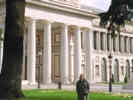 The Velasquez Gate of the Prado Museum. The Velasquez Gate of the Prado Museum.
|
After breakfast I walked to the Prado. Took a major street to another major street, then walked down to the Prado. They had metal detectors, but not x-ray equipment. | ||||||
| The paintings were OK – I think I’m more attracted to the scenes of everyday life like Vermeer, or the really expressive stuff like Van Gogh. But I saw all the important paintings, and bought a guidebook to remember what I had seen. | |||||||
| Left there and walked toward the Museo Regina Sofia. Found a place for lunch and opened up their dining section at 5 minutes to 1. I thought maybe I was much too early for lunch. But by 1:20 the place was packed and there were people waiting. This is the only place where I felt rushed at a meal – but it wasn’t bad – they needed the table for people who were waiting. | |||||||
| At the Queen Sofia museum. We saw some Dali’s, Picasso’s and a bunch of Miro’s, though I’m not sure why those are so important. They also had a special exhibit on Chillada, a sculptor who did the Monument to Tolerance on the river in Seville. | |||||||
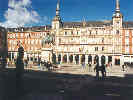 Plaza Mayor. Plaza Mayor.
 Puerto del Sol Puerto del Sol
|
Walked back to the hotel along the direct route of Calle Atocha and took a little rest. A little before 7 I got back up and went walking. Up and down the little streets until I got to Plaza Mayor, then back to Puerto del Sol. By this time I was looking for a place to eat. Started into the Puerto del Sol and noticed a demonstration. I never determined exactly what they were demonstrating for or against. But the biggest banner had a purple ribbon and the one sign we could read said something like, “Where there is violence, there is no democracy.” Then I noticed a much larger demonstration entering the Puerto del Sol. This one seemed to be telecommunications workers who wanted full and dignified employment. | ||||||
| This was also the only time, I felt someone was sizing me up for being a pickpocketee. While I was watching the two demonstrations a clean cut man came and stood very close behind me and a little to my right. I moved up and he moved up with me. Then I just moved further away. He walked away and stood somewhere else in the crowd, then walked off. Maybe I was being sized up and maybe not. | |||||||
| The two demonstrations met and were kept separate by a line of policemen. But there didn’t seem to be any enmity between the two groups. | |||||||
| For dinner I ended up at the Museo de Jamon. I had Plato Combinado No. 2, Jamon Consume and Pollo Asado. Took another pass around the Puerto del Sol and into El Corte Ingles to buy a trashy suspense novel to read on the plane home. Even at 9:30 PM on a damp Thursday evening, there were a lot of people on the street. | |||||||
|
|
Viernes, 26 de Febrero | ||||||
| This morning I got up, had breakfast and went to the airport for our flight home. The breakfast I had at Café Jamaica on Puerto del Sol. To be easy on myself we took a taxi to the airport. … the flight home was very long, but otherwise uneventful. | |||||||
|
|
March 1999 | ||||||
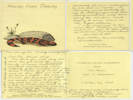 A card from granddaddy. A card from granddaddy.
|
A card from granddaddy.
| ||||||
|
|
April 8, 1999April 8, 1999: Death of Lydia Pawluk Schweich.
| ||||||
|
Locations:
Salinas River.
|
April 14, 1999 | ||||||
|
Other articles:
Locations:
Mid Hills Campground.
Wild Horse Mesa.
|
22 April 1999Trip to Mid Hills
| ||||||
|
Other articles:
Locations:
Barber Mountain.
Pinto Mountain.
Wild Horse Mesa.
|
Saturday, May 29th
| ||||||
|
Other articles:
|
175 |
Packera multilobata (Torr. & A. Gray) W. A. Weber & Á. Löve. Lobeleaf Groundsel.
Lobo Point, San Bernardino County, California. Alluvial plains, flat areas, 1½ miles west northwest of Hole-in-the-Wall, 9 miles north northeast of Mitchell Caverns. 35.0512°N, 115.4236°W. WGS 1984. Coll. No. 175, 29 May 1999, characters observed: Annual, tap-rooted, to 15 cm.; Irregularly hairy when young; Leaves, alternate, to 25 mm., deeply pinnately lobed; Peduncle, 10-18 mm., bracted; Inflorescence, some flowers with strap-shaped corollas, heads composed of two kinds of flowers; Heads, 6-10, radiate; Phyllaries, 2 series, #21, ±equal, not enfolding ray fruits, margins not scarious, tips green, without prominent tack-shaped gland; Receptacle, epaleate, flat; Ray corolla, yellow, 9 mm.; Pappus of well-developed fine bristles on ray and disk fruits. | |||||
|
Other articles:
Species Lists: Salvia dorrii |
176 | Salvia dorrii (Kellogg) Abrams var. pilosa (A. Gray) J. L. Strachan & Rev. Twigs with parasite galls. Bajada 1 km N of Lobo Point, 3 km WNW of Hole-in-the-Wall. 5/29/1999 Lobo Point, San Bernardino County, California. | |||||
|
Other articles:
|
177 | Krameria erecta Schultes. Flowers purple. In rocks 100 m west of and above valley floor, 2.7 km northwest of Hole-in-the-Wall, and 14.7 km northeast of Mitchell Caverns. 5/29/1999 Lobo Point, San Bernardino County, California. | |||||
|
Other articles:
|
179 | Symphoricarpos longiflorus A. Gray. Fragrant Snowberry. | |||||
|
Other articles:
|
183 |
Frasera albomarginata S. Watson.
Wild Horse Mesa, San Bernardino County, California. North slope of Wild Horse Mesa, 5 km WNW of Hole-in-the-Wall. 35.0475°N, 115.4573°W. WGS1984 Elev. 1580 m. In open areas on broken limestones with little to no soil development. | |||||
|
Other articles:
Locations:
Columbia Mine.
Macedonia Canyon.
Mid Hills.
Silver Buddy Mine.
Wild Horse Mesa.
|
Sunday, May 30, 1999I really do not remember when I hiked into the Silver Buddy Mine and took these photos. | ||||||
|
Other articles:
Locations:
Aguereberry Point.
Horse Thief Springs.
|
Monday, May 31, 1999
| ||||||
|
Other articles:
Locations:
Cuesta Ridge.
|
June 1999
| ||||||
|
Other articles:
|
Sunday, September 26, 1999Eremogone macradenia (S. Watson) Ikonn. var. macradenia. Desert Sandwort.Wild Horse Mesa, San Bernardino County, California. North slope of Wild Horse Mesa, 5 km WNW of Hole-in-the-Wall. 35.047°N, 115.4583°W. WGS 194. Elev. 1580 m. Perennial from woody rootstock, opposite needle-like leaves, few yellow flowers on 15 cm stalk, 5 petals, 10 stamens Open places on lacustrine limestone. Coll. No. 189, 29 May 1999, characters observed; Perennial, from woody rootstock, to 30 cm.; Stem, 16-27 cm.; Leaves, opposite, 18 mm. proximally to 6 mm. distally, needle-like, congested bear base, stipules 0; Inflorescence, open cyme; Sepals, free, 4.2-7.8 mm. × 2.5 mm wide, tip acute, folded tightly but not a spine; Petals, entire, claw 0; Styles, 3; Fruit, capsule, sutures 6. | ||||||
|
Other articles:
|
189 |
Eremogone macradenia (S. Watson) Ikonn. var. macradenia. Desert Sandwort.
Wild Horse Mesa, San Bernardino County, California. North slope of Wild Horse Mesa, 5 km WNW of Hole-in-the-Wall. 35.047°N, 115.4583°W. WGS 194. Elev. 1580 m. Perennial from woody rootstock, opposite needle-like leaves, few yellow flowers on 15 cm stalk, 5 petals, 10 stamens Open places on lacustrine limestone. Coll. No. 189, 29 May 1999, characters observed; Perennial, from woody rootstock, to 30 cm.; Stem, 16-27 cm.; Leaves, opposite, 18 mm. proximally to 6 mm. distally, needle-like, congested bear base, stipules 0; Inflorescence, open cyme; Sepals, free, 4.2-7.8 mm. × 2.5 mm wide, tip acute, folded tightly but not a spine; Petals, entire, claw 0; Styles, 3; Fruit, capsule, sutures 6. | |||||
|
Other articles:
|
199 |
I'm really not sure what this is. However, it looks like it could be a Verbena gooddingii that put out some late Summer growth; needs to be re-visited.
Verbena gooddingii Briq. Southwestern Mock Vervain. Pinto Mountain, San Bernardino County, California. About 19 air miles northeast of Kelso, and 33 air miles southwest of Searchlight, Clark County, Nevada. Elev. 1662 m. South slope of the mountain. | |||||
|
Other articles:
|
200 |
Chenopodium incanum (S. Watson) A. Heller var. occidentale D. J. Crawford. Western Mealy Goosefoot.
Pinto Mountain, San Bernardino County, California. About 19 air miles northeast of Kelso, and 33 air miles southwest of Searchlight, Clark County, Nevada. 35.1728°N, 115.3847°W. WGS 1984. Elev. 1662 m. South slope of the mountain. Coll. No. 200, 26 Sep 1999, characters observed while keying: Annual, minutely scaly or powery; Stem not jointed, not fleshy; Leaves well-developed, not fleshy, or weakly fleshly, 3-veined from base, ± wide as long, sides not parallel, not spine-tipped, distal not clasping; Inflorescence bracts not spine-tipped; Flowers parts 5, calyx not horizontly winged in fruit, not tubercled, appendages 0, thin in fruit; Fruit wall free from seed, not pitted Seed horizontal, hidden by calyx, margins obtuse. | |||||
| 202 | Psilostrophe cooperi (A. Gray) E. Greene. Pinto Mountain in small canyon on return from my experimental plots in Frasera albomarginata. | ||||||
|
Other articles:
|
Later I learn that "Cooper" was James Graham Cooper (1830-1893). | ||||||
 Collection No. 190, Centaurea calcitrapa, purple starthistle. Collection No. 190, Centaurea calcitrapa, purple starthistle.
|
190 | Centaurea calcitrapa Purple starthistle. Growing in the gravel of an old quarry road. | |||||
|
[Previous Page]
[Next Page]
Go to page: [1800s] [1900s] [1910s] [1920s] [1930s] [1940s] [1950s] [1960s] [1970s] [1980s] [1990] [1991] [1992] [1993] [1994] [1995] [1996] [1997] [1998] [1999] [2000] [2001] [2002] [2003] [2004] [2005] [2006] [2007] [2008] [2009] [2010] [2011] [2012] [2013] [2014] [2015] [2016] [2017] [2018] [2019] [2020] [2021] [2022] [2023] [2024] [2025] [A] | |||||||
| If you have a question or a comment you may write to me at: tomas@schweich.com I sometimes post interesting questions in my FAQ, but I never disclose your full name or address. |
Date and time this article was prepared: 5/12/2025 2:50:54 PM |
||||||